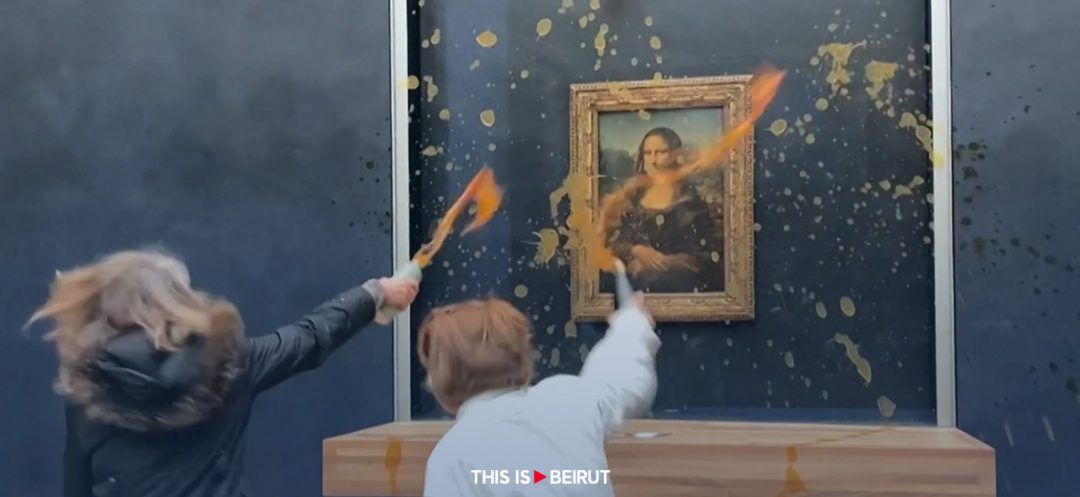
The tranquil halls of the Louvre Museum were disrupted on Sunday when an unexpected event unfolded before Leonardo da Vinci's Mona Lisa. Two protesters, in an act that has garnered global attention, hurled pumpkin soup at the bulletproof glass protecting the famed artwork. This act of defiance was not a statement against the Renaissance masterpiece but a bold call for the right to "healthy and sustainable food."
As spectators gasped in shock, the orange streams of soup splashed harmlessly onto the protective glass. The women behind this act stood their ground, questioning the onlookers, "What is more important? Art or the right to healthy and sustainable food?" Their message was clear: society's priorities must be scrutinized, especially when basic human needs are at stake.
The group claiming responsibility, Riposte Alimentaire (Food Retaliation), has launched what they call a "campaign of civil resistance." Their demands are straightforward: the establishment of a social security system dedicated to sustainable food. They envision a scheme where democratic assemblies would select subsidized food items, enabling citizens to have a direct say in their food choices.
This incident at the Louvre is part of a broader pattern of similar protests targeting iconic artworks. Last year, activists from the Just Stop Oil group made headlines when they threw tomato soup over Vincent van Gogh's Sunflowers in London. These actions are not mere hooliganism; they represent a growing frustration with the perceived inaction on critical global issues like climate change and sustainable living.
 Photo By David Cantiniaux/AFPTV/AFP
Photo By David Cantiniaux/AFPTV/AFPThe protestors' method, while controversial, shines a spotlight on a pressing concern. According to an Ipsos survey, one in three French people struggle to afford healthy meals daily. This statistic is alarming and raises questions about the effectiveness of current food policies and the widening gap between the haves and have-nots in society.
French Culture Minister Rachida Dati condemned the soup attack, asserting that no cause justifies targeting cultural heritage. Her sentiments reflect the delicate balance between preserving art and acknowledging the voices of dissent. The Mona Lisa, behind bulletproof glass since 2005 due to past attacks, remains unscathed, but the protestors' message has undoubtedly left a mark on public consciousness.
The incident also coincides with ongoing protests by French farmers demanding better pay and regulations. These agricultural workers, essential to the food supply chain, are voicing their discontent and adding weight to the protestors' concerns. The French government, under pressure with the European Parliament elections looming, is scrambling to address these issues.
Critics of such dramatic protests argue that targeting artworks detracts from the legitimacy of the cause. However, advocates counter that such actions are necessary to bring urgent issues to the forefront of public discourse. The choice of the Mona Lisa, a symbol of enduring art and culture, as the medium for this message, is a strategic move to command global attention.
The "Mona Lisa soup incident" is more than a shocking headline. It challenges us to reevaluate our priorities and address the fundamental issues of food security and sustainability. As we navigate the complexities of modern society, the intersection between art, activism and social justice continues to evolve, prompting us to question and redefine the value we place on our cultural treasures versus basic human needs.
With AFP
Two environmental activists threw soup at the protective glass surrounding the #MonaLisa painting at the #LouvreMuseam, voicing support for a sustainable food system amid ongoing protests by French farmers. pic.twitter.com/5WofnRu4qC
— This is Beirut (@ThisIsBeirut_)Two environmental activists threw soup at the protective glass surrounding the #MonaLisa painting at the #LouvreMuseam, voicing support for a sustainable food system amid ongoing protests by French farmers. pic.twitter.com/5WofnRu4qC
— This is Beirut (@ThisIsBeirut_) January 28, 2024



Comments